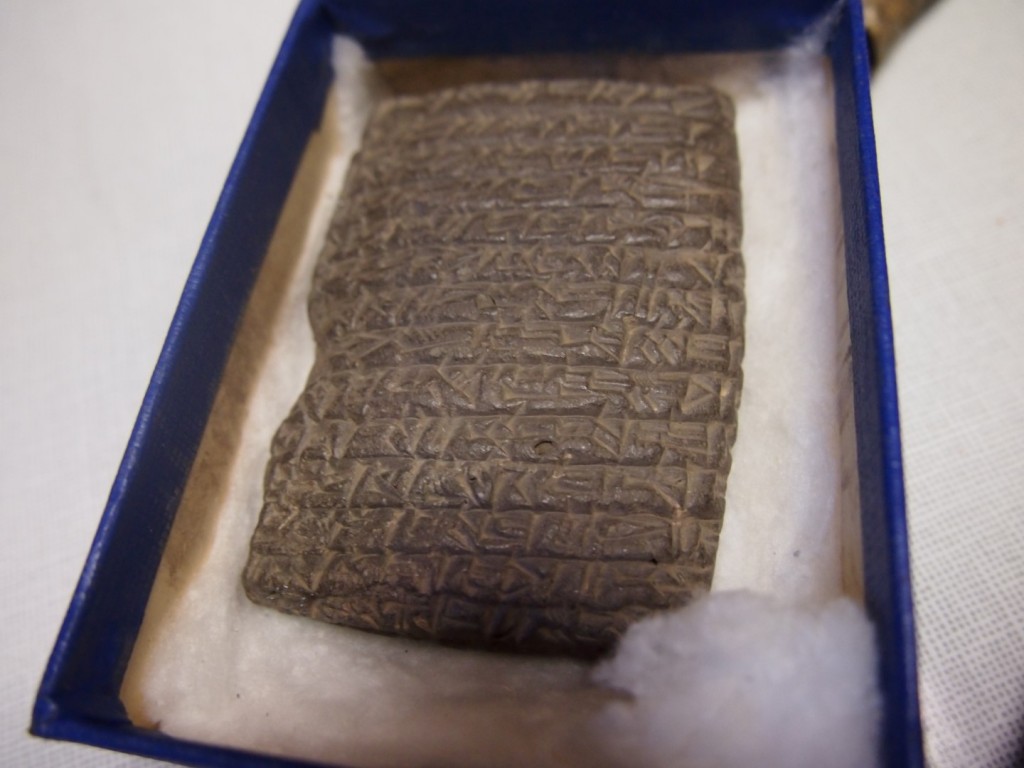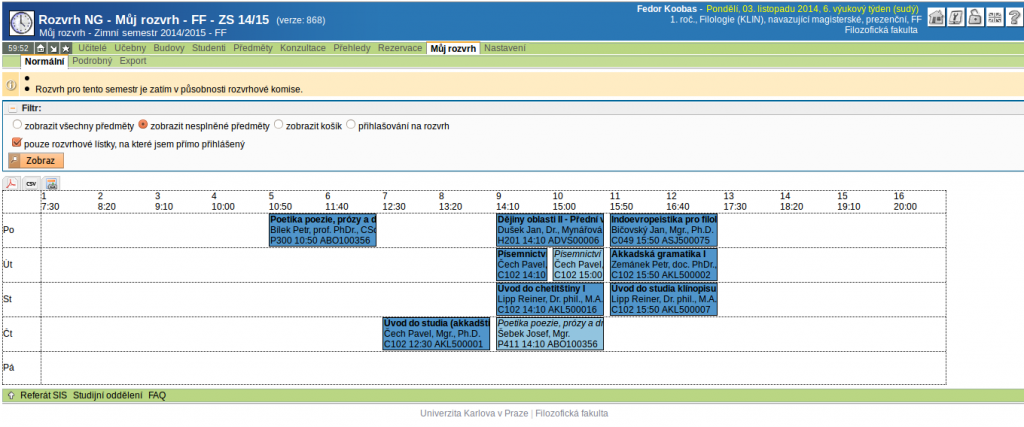
In the article about the information system I briefly touched on the topic of schedule and subjects. In this note I'd like to describe this in more detail.
Schedule
I study only 4 days a week - by Russian standards quite little. I have 2-3 classes a day. You can enroll in more, but there's no point.
It's believed that, first, masters should have more free time (some are already working, some study at home).
Second, masters, supposedly, know themselves what they need and what they don't, so a "completely uninteresting" subject rarely appears in the program.
In general, if you ask very nicely and explain to the teacher why you don't want to study this or that subject, the curriculum can even be changed a bit over time, but it's still too early for this.

As you can see, free time, in theory, is enough. But despite the seeming light load, there's quite little time left - in the evening after study there's not much energy to do anything else (except eating and procrastinating).
Also, perhaps you'll be surprised by 5-minute breaks. Yes, this is really so, although usually teachers finish the lesson a bit earlier than necessary. On the other hand, no one keeps you in class, so you can always leave early if needed. It's also worth noting that there are no bells or other types of class start\end signals.
Credit system
I'll briefly tell about a fairly well-known topic when studying abroad. In Czech Republic, like in all of Europe - credit system of study. This has nothing to do with money and banks.
The point is that for passing a subject you earn a certain number of points. To transfer to the next year, to get a diploma - you need to earn a certain number of points.
For me to transfer to the next year (not semester) it's enough to earn 30 points, and to get a diploma - 180. If you think about it, it turns out that in a semester it would be good to earn 30 credits.
In any case, you can study for free for another year, so there's no need to hurry. I enrolled in subjects for 28 credits + a subject designed for 2 semesters for 5 credits. Credits will be added to you regardless of your grade, the main thing is that it's positive (people become excellent students here only for scholarship, and even those, it seems, no one particularly saw).
Subjects of 1st semester 1st year
Most subjects are about cuneiform and ancient languages. We often have to deal with clay tablets, you can see a photo of one of them at the very beginning of the article. Subject names are links to them, available only through the information system. At the end of the name is the subject code, if you suddenly want to find it in the system.
Poetika poezie, prózy a dramatu I ABO100356
As is clear from the subject name - this is introduction to poetics, theory of literature. Classes 2 times a week - 1 lecture and 1 seminar. Lecture is ordinary, talk is about everything. Seminars are more interesting. At home you need to read several pages of a book, then everyone discusses it together. The first weeks were a bit difficult for me - I had to answer monosyllabically, Czech language let me down a bit :)
Now I answer, probably, more than everyone - fear of speaking disappeared, and no one focuses on mistakes. By the way, literature classes in Poděbrady helped a lot - I often give examples from Czech literature, understandable to the whole group. By the way, strangely enough, classmates know "Master and Margarita" best from Russian literature.
Dějiny oblasti II - Přední východ ADVS00006
This is Middle East history. Perhaps this subject is hardest for me - I'm not at all strong in history, and lectures are dictated quite quickly, I don't have time to write everything down, I don't understand half. I advise the subject only to those who are into this. By the way, the number 2 in the name shouldn't confuse you - at first I thought this was a continuation of the subject, accordingly, much would be repetition, however under number 1 simply hid the history of Egypt.
Indoevropeistika pro filology ASJ500075
One of the most "fun" subjects. It's taught by Mr. Bičovský, a cheerful professor from my department. I liked him back at the exam, because he joked the most.
The atmosphere in class is quite relaxed - he tells about Indo-European languages, their development. From the indispensable - it's exactly here I learned that the words "beef" and "shit" - once historically had the same root.
Písemnictví starého Předního východu doby bronzové ASJ500095
This subject is taught by Mr. Čech - he teaches most of our subjects. Essentially, here we simply study the history of writing and introduction to languages of that time.
Akkadská gramatika I AKL500002
Quite a popular subject, grammar of Akkadian language (by the way, this language is my future specialty). We study in Latin style - there's a large incomprehensible book that you just need to slowly memorize.
Úvod do chetitštiny I AKL500016
This subject is taught by a doctoral student from our department. For interest, both by students and teacher it was decided to teach the subject in English. This, in my opinion, is even harder than in Czech - the head doesn't remember English so quickly anymore. That's what it means to learn a language in the right environment - in Czech you can already speak without thinking. Translating the subject name to Russian - this is introduction to Hittite language. It differs from the previous one in that it's Indo-European, which means we understand it quite normally. By the way, it was exactly this that was first deciphered by Bedřich Hrozný - founder of our department. I'll immediately boast - Czech scientists, perhaps, in their time succeeded almost more than anyone in studying cuneiform, so our department is very well known in the cuneiform world :)
Úvod do studia klínopisu AKL500007
Here we study what this cuneiform is :) Teachers here are different, topics are also completely different. We also study different approaches to studying there - chemical, historical, etc.
Úvod do studia (akkadština) AKL500001
Here we study mainly the history of studying cuneiform languages - who became famous for what in this sphere, who's going to become famous for what. From the interesting - at the beginning of each class students prepare 5-minute oral presentations on the topic of what interesting happened in the cuneiform world. Like it or not, you'll still have to speak Czech :) Summing up - the goal of most subjects now is to interest us and inspire to study something of our own. Overall, now we're studying only basics, because there are still 2.5 years of study ahead.